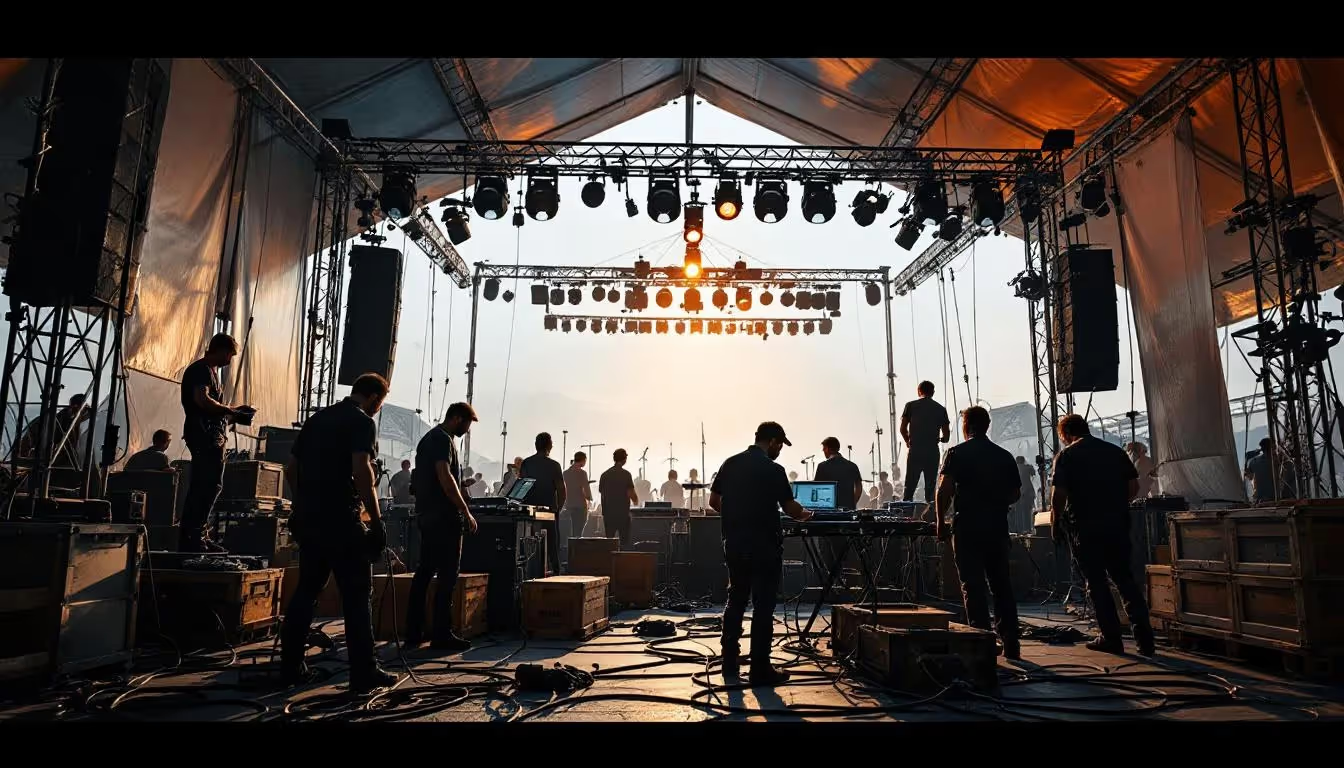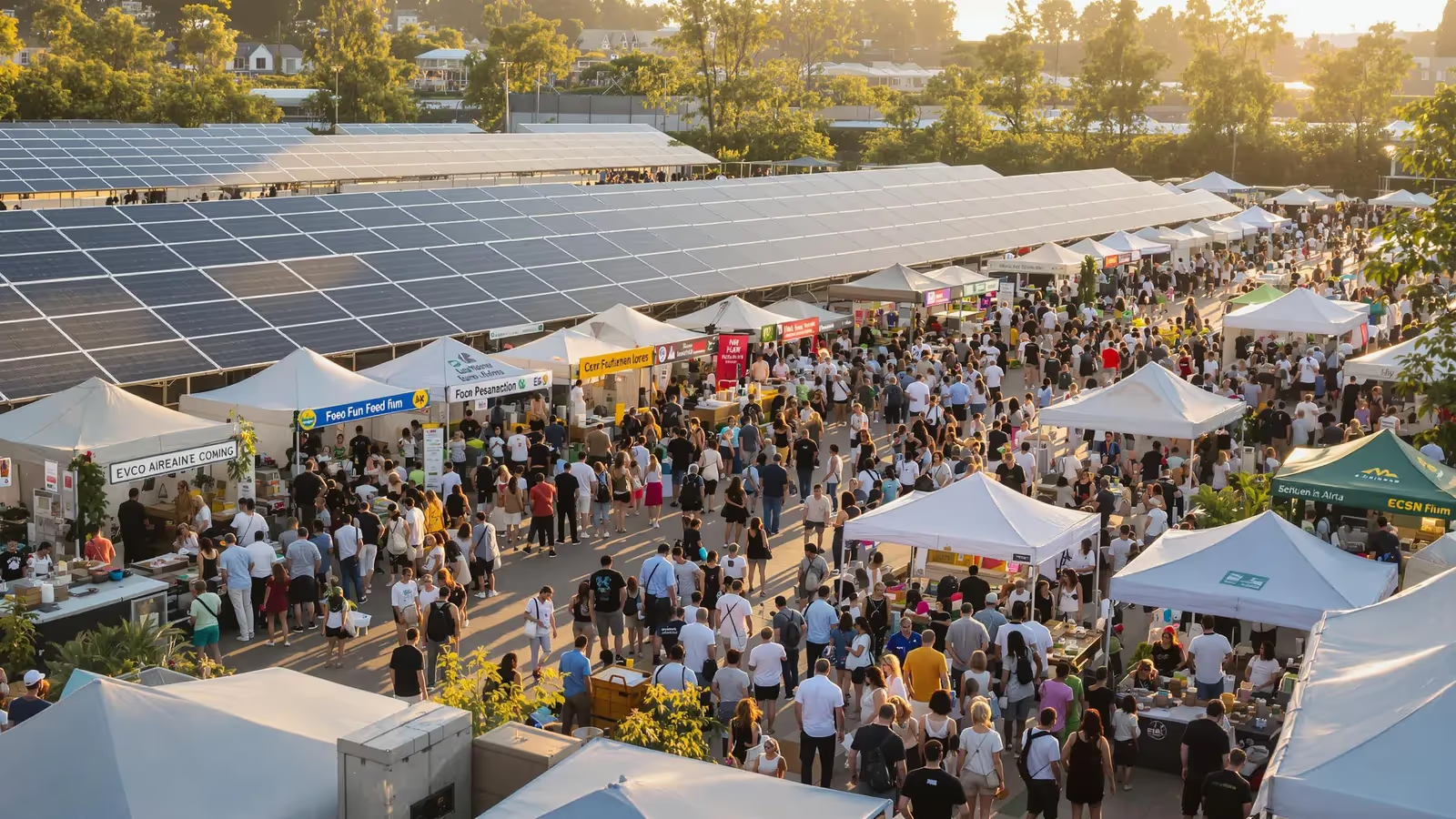The technical management of festivals: specificities and logistical challenges
Organizing a festival is like orchestrating a complex symphony where every element must be in perfect harmony. However, behind the glittering curtain of cultural events lies a well-oiled machine, the technical management, which ensures the smooth running of the show. Let's explore some of the most crucial aspects of this titanic task.
What is technical management in a festival?
At the heart of any great cultural event is a technical management team. This group of professionals is responsible for ensuring that all technical aspects of a festival run smoothly. This includes not only lighting and sound, but also video management, special effects, and any other technological requirements needed to provide an unforgettable experience for the audience.
The main objective of the technical management is to perfectly synchronize these various elements. They must often work under pressure, particularly when time is short or last-minute changes are necessary, thus demonstrating their mastery of contingency management. Their ability to react quickly and efficiently is essential to the success of a festival.
The main components of technical management
- Lighting: essential for creating the desired atmosphere and highlighting performances.
- Sound: ensuring impeccable acoustics so that every note, word, or effect is heard clearly by the audience.
- Video: visual projections, giant screens, etc., for total immersion.
- Special effects: smoke, lasers, pyrotechnics to enhance the show.
These components represent the foundations upon which all the technical aspects of a festival rest. Their skillful combination transforms the event into a true sensory celebration. To learn more about shared experiences on this topic, check out our blog.
What are the logistical challenges of technical management?
One of the first major challenges faced by a technical management team is planning. Even before the artists take the stage, every logistical detail must be meticulously organized. From technical coordination between the various service providers to the transportation of equipment, each step requires special attention.
Next, there's safety, for both the teams and the audience. All technical installations must adhere to strict standards to prevent accidents. Technicians must also be trained to handle emergency situations, proving that a good technical management team knows how to anticipate as much as react.
Equipment transport and installation
The transport of equipment is a major challenge in itself. Each piece must be carefully packaged, shipped, and installed with precision. This step requires exceptional coordination between the various services involved in event logistics. Errors can lead to costly delays or compromise the quality of the show.
In addition, the installation must often be carried out in record time. Technicians are constantly enhancing their expertise to improve the efficiency of installations while meeting sometimes very tight deadlines. This agility is one of the key characteristics of any successful event.
How does the technical management team handle artists during a festival?
Artist management is a delicate aspect of festival programming. Ensuring a flawless schedule and coordinating the specific needs of each artist is a real organizational challenge. Each artist must receive technical support appropriate to their performance and respect the established time constraints.
This implies fluid communication between all the teams involved. Whether it's adjusting specific sound equipment or preparing special lighting, every detail must be perfected. Rigor in this coordination guarantees the artist's comfort while ensuring a high-quality performance for the audience.
Accommodation and related services
During the festival, it is also essential to take care of accommodating the artists and their teams. Finding suitable accommodations and coordinating their transportation to and from the site requires significant organization in terms of event logistics. It's a logistical puzzle that must be carefully assembled.
In addition to accommodation, various other services, such as catering or VIP reception, must be provided to meet the diverse needs of the artists. Offering a personalized service can make a noticeable difference in their overall experience.
Technological tools for optimizing the technical control room
With the rapid evolution of technologies, the technical control room now has many tools to simplify and optimize its operations. For example, some software allows for better management of planning and real-time monitoring of the progress of each task. The use of integrated platforms also facilitates technical coordination between different units.
Other innovations support the control room, such as automated lighting and sound systems, which significantly reduce the margins for human error. This lightens the mental load on teams while providing a very high-precision result. Thanks to these advances, the level of requirements can be considerably raised.
Security and advanced technologies
Some specialized applications now make it possible to anticipate and manage potential crises during the festival, particularly in the event of unfavorable weather or technical hazards. Using advanced detection and rapid response systems helps to enhance the overall security of the event while protecting participants.
The implementation of these tools requires a significant initial investment. However, the long-term benefits in terms of security and fluidity largely justify this effort. The use of these technologies effectively transforms logistical challenges into opportunities for development and innovation.
Event logistics and the future of technical management
With the global pandemic having redefined working methods, event logistics has undergone a radical transformation. Technical management has had to adapt to new standards of physical distancing and a changing environment. All this reinforces the need for increased flexibility and ever more precise anticipation in the preparation of each technical aspect.
Some festivals have chosen to turn to hybrid formats, combining on-site services and digital broadcasts. While this introduces new challenges, it also broadens the scope of possibilities. Technical skills are becoming more versatile, also encompassing the fields of streaming and digital audiovisual production.
Future prospects
Looking to the future, technical management continues to evolve with the progressive adoption of green technologies and sustainable practices. Initiatives to reduce the ecological footprint of festivals are growing, directly influencing logistical practices. This transition aims to satisfy both the growing collective awareness of environmental issues and the operational requirements of major events.
Ultimately, technical management remains the invisible pillar around which all efforts revolve. As innovations continue to transform the entertainment industry, only proactive anticipation and flawless execution will make it possible to write the future chapters of global cultural history.




